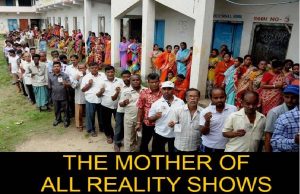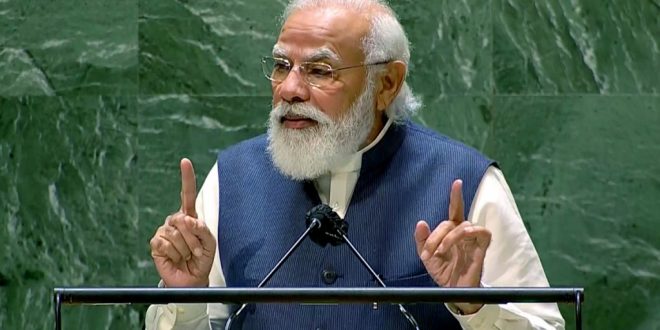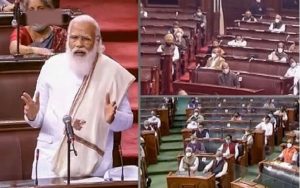29-09-2021
Bureau Report + Agencies
NEW DELHI/ ISLAMABAD/ UNITED NATIONS: In his address to the United Nations General Assembly on Saturday, Indian Prime Minister Narendra Modi said that India is known as the “mother of democracy”. This was a repetition of the statement he gave in April while addressing the Vice-Chancellors of Indian Universities.
The basic elements of democracy were found in hunting and gathering societies, which existed some ten thousand years ago. Then, humans lived in small groups of about fifty to a hundred people.
When these people had to resolve an issue, they would sit down and decide by taking opinions from everyone. These groups valued the views of their members alike and cared for their well-being.
Known history tells us that such groups were first evolved in Africa. So, it can safely be argued that the development of the democratic principles started in the areas far away from India where people settled relatively later but when the great civilizations emerged, the rulers began to govern their subjects through the assembly. The earliest such example is found in the 12th century B.C., when the head of state in Phoenicia (present-day Lebanon) consulted with the assembly of people to resolve the country’s problems.
Historian John Keane in his 2009 book “The Life and Death of Democracy” mentions an Egyptian trader who was surrounded by pirates. The prince had to convene an assembly to resolve the issue. This tradition of resolving matters th rough consultation of the assembly continued in later periods and spread from Africa to other parts of the world.
rough consultation of the assembly continued in later periods and spread from Africa to other parts of the world.
In the 7th century B.C., the foundation of democracy was laid in Athens when Solon became king. He drafted the Athens Code of Law and took steps to end the domination of the nobility.
Later, in the times of Cleisthenes, equal rights for all men were proclaimed and that is the reason he is recognized as the father of democracy.
During that period, the word “demokratia” was written, spoken and came to be in frequent use by the Greeks. “Demokratia” means the government of the people and the Athenians used this word to express their system of government.
Later in the 4th century B.C., Plato wrote “Republic” and Aristotle inked “Politics”. Many ideas were developed during this time about freedom, consultation and governance which are essential parts of democracy. Owing to these services, Athens is considered the “birthplace of democracy”.
At the time when all this was happening in Greece, the people of India were divided into four major castes. The basic elements of democracy, equality of rights and equal participation in governmental affairs were completely absent from their system. Chanakya’s book “Arthashastra” bears witness to this.
 Looking at the contribution of different nations towards democracy, we find that political philosophy was founded by Greeks, modern-day political parties originated in Britain, and New Zealand was the first country in the world to give men and women equal suffrage. India pioneered nothing, invented nothing and contributed nothing to the development of democracy. Then why should she be considered the “mother of democracy”? Just because she has been running a system continuously for 70 odd years?
Looking at the contribution of different nations towards democracy, we find that political philosophy was founded by Greeks, modern-day political parties originated in Britain, and New Zealand was the first country in the world to give men and women equal suffrage. India pioneered nothing, invented nothing and contributed nothing to the development of democracy. Then why should she be considered the “mother of democracy”? Just because she has been running a system continuously for 70 odd years?
Assessing Modi’s claim from another angle, data reveals that more than a hundred countries had added “republic” to their names before India did so.
If population is the criterion to judge the democratic stature of a nation, the People’s Republic of China should be placed ahead of India as it also claims to be a socialist democracy.
Looking at the proponents of democracy, we find the claims of the United States way ahead of others. So, why the Indian Prime Minister called India the mother of democracy is beyond comprehension.
 Pressmediaofindia
Pressmediaofindia





